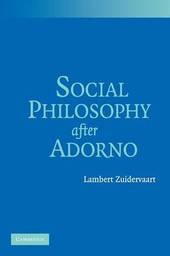
|
Social Philosophy after Adorno
Paperback / softback
Main Details
| Title |
Social Philosophy after Adorno
|
| Authors and Contributors |
By (author) Lambert Zuidervaart
|
| Physical Properties |
| Format:Paperback / softback | | Pages:232 | | Dimensions(mm): Height 229,Width 152 |
|
| Category/Genre | Western philosophy from c 1900 to now
Social and political philosophy |
|---|
| ISBN/Barcode |
9780521690386
|
| Classifications | Dewey:193 |
|---|
| Audience | | Tertiary Education (US: College) | | Professional & Vocational | |
|---|
| Illustrations |
Worked examples or Exercises
|
|
Publishing Details |
| Publisher |
Cambridge University Press
|
| Imprint |
Cambridge University Press
|
| Publication Date |
9 July 2007 |
| Publication Country |
United Kingdom
|
Description
Lambert Zuidervaart examines what is living and what is dead in the social philosophy of Theodor W. Adorno, the most important philosopher and social critic in Germany after World War II. When he died in 1969, Adorno's successors abandoned his critical-utopian passions. Habermas in particular, rejected or ignored Adorno's central insights on the negative effects of capitalism and new technologies upon nature and human life. Zuidervaart reclaims Adorno's insights from Habermasian neglect while taking up legitimate Habermasian criticisms. He also addresses the prospects for radical and democratic transformations of an increasingly globalized world. The book proposes a provocative social philosophy 'after Adorno'.
Author Biography
Lambert Zuidervaart is Professor of Philosophy at the Institute for Christian Studies and an Associate Member of the Graduate Faculty in the Department of Philosophy at the University of Toronto. A specialist in hermeneutics, social theory, and German philosophy, he is the editor and author of several books, most recently Artistic Truth: Aesthetics, Discourse, and Imaginative Discourse, which was selected by Choice as an Outstanding Academic Title for 2005 and which also received the Symposium Book Award from the Canadian Society for Continental Philosophy in 2006.
Reviews"This is a great book which discloses new perspectives in reading and transforms Adorno." -Hauke Brunkhorst, Universitat Flensburg, Notre Dame Philosophical Reviews
|